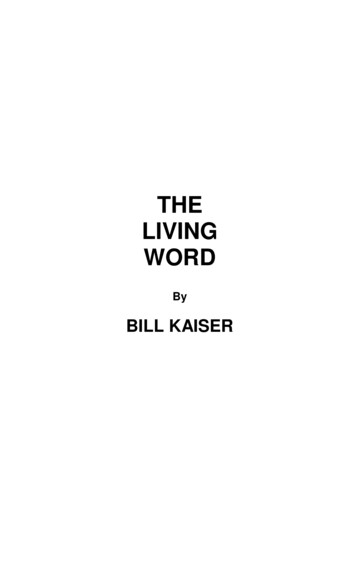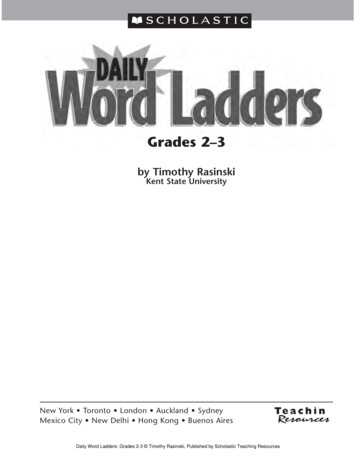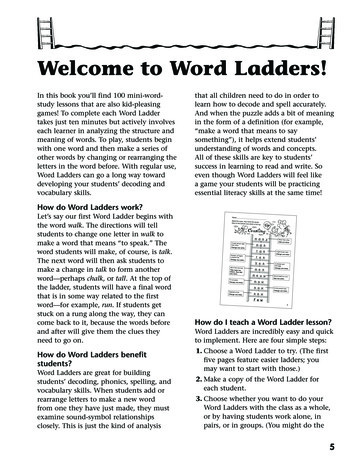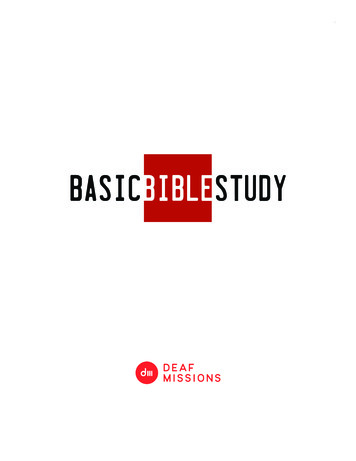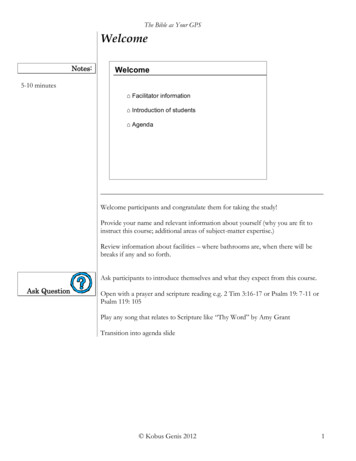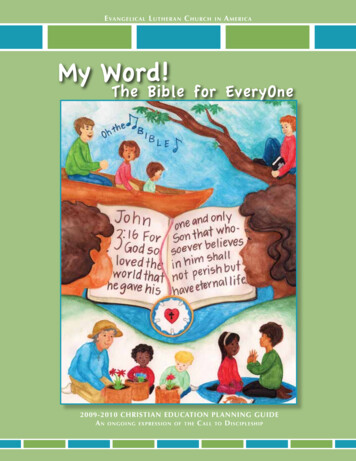
Transcription
E vangelical L utheran C hurchinA m ericaMy Word!The Bible for EveryOne2009-2010 CHRISTIAN EDUCATION PLANNING GUIDEA n ongoing e x pression o f the C all to D iscipleship
What’s Inside?Welcome Disciples!3Introduction to the Theme4My Word! Leader Bible Study5Commitment and Affirmation of Leaders9Children’s Message10Martin Luther, EveryDay Disciple12Cross-generational Rally Day Festival14Holy Wisdom, Holy Word song23There’s a Bible On Your Eyelid? Skit24Bible in the Classroom and at Home272009-2010 Planning Calendar30How to Use This ResourceAdapt this material to fit your setting. Consider using it as you plan and prepare to launch the 2009-2010 education year as you pick and choose elements and incorporate them in your educational programs throughoutthe year in conjunction with materials from previous planners to carry out your own on-going responseto the Call to Discipleship in mid-week activities, after-school programs, special-event days, orsummer programming as an additional element in your congregation’s Book of Faith activities. For more informationabout the ELCA Book of Faith Initiative, visit www.bookoffaith.orgBe sure to maximize your use of Web page references found throughout this resource.This program planning guide is designed to be both a print and an electronic resource. For allmaterial related to this resource, including the full contents of the print resource, clipart, and othersupplemental materials, visit www.elca.org/ce/programplanner 2009Copies of this resource may be ordered by calling 800-328-4648. Use order code ITEM001428The item is free except for the cost of shipping. (Limit 8 per congregation.)Scripture quotations are from New Revised Standard Version Bible, copyright 1989 by the Divisionof Christian Education of the National Council of the Churches of Christ in the USA and used bypermission. Cover art and art on pages 8 and 9 includes scripture taken from the Holy Bible, NewInternational Version , copyright 1973, 1978, 1984 International Bible Society. Used by permissionof Zondervan Publishing House. All rights reserved.My Word! The Bible for EveryOne 2009-2010 Christian Education Planning Guide developed by ELCAChristian Education of the Evangelical Outreach and Congregational Mission unit. Copyright 2009Evangelical Lutheran Church in America. All rights reserved. Permission is granted to photocopy thisresource provided copies are for local use only and each copy carries all copyright acknowledgmentsfound in the publication.Project Manager and Editor, Diane MonroeWriters, David Daubert, Emily Demuth Ishida, Diane MonroeMusic Composer, David MorstadDesigner, Sharon Martin2Illustrator, Virginia Campbell
Welcome Disciples!We are born to hear God’s word. The texts we hear, discuss, repeat, and wrestle with are truly theSpirit of God reaching out to us at every moment in our lives. This planning guide is intended toassist Christian education leaders as they engage people of all ages and especially children in a life ofdiscipleship grounded in scripture. As adults who work or live with children, we have the privilege andresponsibility to nurture an awareness of God’s presence in their lives and the confidence that they arecalled to reflect God’s word in their day-to day activities!This year’s guide is marked by several helpful features: It is designed as a resource related to the ELCA Book of Faith Initiative. As we continue with our “EveryDay Disciples” series, it is fitting that the spotlight shines on thelife and ministry of Martin Luther. We are told in one of Luther’s “table talks” that he read theBible so thoroughly and so often that he knew what was on every page. He wanted the Bible to beaccessible for everyone and so he translated it from Latin to German. (page 12) Martin Luther plays a significant part in this year’s Cross-generational Rally Day Festival. (page 14) A children’s message to help worship leaders integrate the Bible and the My Word! theme intoworship. (page 10) Holy Wisdom, Holy Word. Music and lyrics suitable for all ages and intended to be used inworship, children’s ministry programs, and as a theme song accompanying Book of Faith activities.(page 23) A Take-home connection helps parents and grandparents create time, space and opportunity forregular scripture engagement at home. (pages 27-29)An Ongoing Expression of DiscipleshipThis resource is the latest addition to the constellation of resources carrying out the Call toDiscipleship initiative www.elca.org/ceplanners is your one-stop entry point for accessing all theprevious program planning guides in this series.Each annual planning guide focuses on one specific aspect of discipleship.Visit www.elca.org/Intergenerational for a quick overview of: the previous themes information on Bible studies related to the seven faith practices and a complete list of Intergenerational Rally Day modulesHear Presiding Bishop Mark Hanson reflect on Colossians 3 atwww.bookoffaith.org/bof new/colossians3.htm3
My Word! The Bible for EveryOneLet the word of Christ dwell in you richly; teach and admonish one another in all wisdom; and withgratitude in your hearts sing psalms, hymns, and spiritual songs to God. Colossians 3:16Introduction to This Year’s ThemeWelcome to the Christian Education Planning Guide for 2009-2010! This year will be an exciting yearfor people of all ages. It will be a chance for everyone to dig deeper into scripture and to encounterGod there.This year’s “EveryDay Disciple” is Martin Luther. Did you know that Luther was a Bible teacher? Heloved scripture and taught the Old Testament. Luther liked to say, “Scripture is the manger in whichthe (Christ) child is laid.” What he meant is that the Bible is not so much about words on a page. It is aplace where we meet Jesus! And we read the Bible, not primarily as a handbook for life, but rather asan encounter with the living Christ.Our theme verse comes from Colossians 3:16. When we let the word of God dwell in us, what is itthat we are allowing? It is about an encounter with a God who has come to us in Jesus to dwell amongus. Now, the author of Colossians calls us to allow this event to happen in us! This is incarnationallanguage. That means that what God has done in Christ is to be continued by his followers!Lutherans have long believed that within the pages of scripture God has spoken and continues tospeak to us. In these pages the community of faith has agreed that God is speaking to us. The Bible isan entrance to a life that looks for a God who is active and out in the world. By hearing God where weKNOW God is speaking (in scripture) we can train our ears to discern God’s voice in the midst of allthe noise in the world around us.THE GOAL OF THIS CHRISTIAN EDUCATION PLANNER IS TO EQUIP YOU TO HELP PEOPLE INYOUR CONGREGATION: Engage the Bible in new ways and with new energy. Find ways to move from words on a page to an encounter with a living God who speaks throughthe Bible but is also present and active in all of life. Implement ways to make scripture a regular part of daily life and a place where disciples areshaped by an active and working God.4
Leader Bible Study“Let the word of God dwell in you richly.” Colossians 3:16aThemeThere is often a sense that Jesus is someone who lived a long time ago in a land far away. Yet whenthe text from Colossians was written, Jesus had already been crucified and raised from the deadfor many years. Many of those who were alive when it happened had already died as well. But theauthor understood how God’s word works in the present and doesn’t just tell us about the past, it alsoDWELLS in us in the here and now!PurposeThe goal of this Bible study is to help people who serve as leaders in Christian education incongregations. Those leaders will be encouraged to think about the word of God in many ways andto reflect on how their teaching can move from information about the Bible to a way of hearing Godspeak to us now. People will discover that God’s word is both bigger than we often think and closerthen we often notice. And it is not just a “religious” thing to spend time in the Bible, it is a way ofbeing a part of what God is up to in the world.Main IdeasThe Bible is the “word of God” but it bears that word for us to meet a God who is alive. We’ll try toemphasize that the word of God is more than ink on a page. God’s word is on the move and doingmany things. The three things we’ll explore in this study include:It is creative – it brings life,It is incarnational – it participates in life,It is meaningful – it helps make sense of life.Three Main ComponentsThis Bible study is designed with three main components. These three parts can be used as the core ofa leaders’ retreat over the course of a day or extended outing. Or leaders can use these as three partsin a series of three studies on the word of God. They are designed so that anyone can lead them—theinstructions cover all that needs to be known and no experts are required. God’s word is a creativeword. So use these studies to explore how living in that word calls you to be creative as well!Each component contains: A discussion starter A Bible reading A place for reflection Questions for you to ponder and talk over together A time to pray (out loud) together5
Participating in CreationBible Study #1Discussion Starter:There is an increased interest in creation and our role in caring for it. How is care of creation beingexpressed in your lives as disciples?Bible Reading: Genesis 1:1-31Here we see that God’s word is a creative one. And God both sees that it is good and calls onhumankind to be stewards of the world God has made.Reflection: What is God doing in this text? What is God saying to you personally as you read and/or listen to this passage? What is God sharing with you collectively (your small group, congregation, etc.) in this text? Whatlessons are you to hear together? How does the creative word of God influence us, as it should, in our lives as disciples of Jesus?God speaks and good things happen! In some Christian traditions people have considered the world“disposable” since getting people to heaven is the goal. But much of the ministry of Jesus points tothe reality that God is very concerned with what happens here. One apocryphal story tells of Lutherplanting a tree. He is asked, “If you knew Jesus was coming tomorrow, what would you do?” Lutherreportedly answered, “I would still plant a tree.” What if the whole point of Jesus coming into theworld is to make sure we know how much the world matters to God?To Ponder Together: How does your congregation help people meet a God in scripture who cares about the world? What regular things does your congregation do to participate as good stewards of creation as ituses resources? What could it consider doing?Prayer:Close together by praying out loud with prayer for the world that God has made and loves. Includeprayers for people and situations needing prayer now.66
The Word Became FleshBible Study #2Discussion Starter:Where have you seen God at work recently? What makes you think it was God?Bible Reading: John 1:1-8John is very excited about the word that made the world now coming to be involved as a part of it inJesus. He begins God’s creative work in Jesus by connecting it to God’s creative work in creation.Reflection: What is God doing in this text? What is God saying to you personally as you read and/or listen to this passage? What is God sharing with you collectively (your small group, congregation, etc.) in this text? Whatlessons are you to hear together? What ways can you help others “see” God in the flesh and encounter a living Christ?One of the amazing claims of Christianity is that the God who made the world dared to come downin the middle of it. It was a huge risk and one that almost no one saw coming. In fact, John remindsus that even the people who should have been best prepared for this had trouble believing it andultimately rejected Jesus. At the same time, John sees the amazing truth that in Jesus God is acting toinvite anyone and everyone to connect with God. And this is a God whose love and commitment aredeep enough to persist through even death and continue being a part of our lives. Believing this bringsthe life-changing gift that turns ordinary people into children of God!To Ponder Together: How does the ministry of your congregation help people not just to hear about Jesus who camelong ago, but also to meet Jesus in the present? If believers are children of God and given new life in Christ, how does your congregation teachand train everyone for their role as a disciple called to carry on the work of Jesus, in the churchand in the world?Prayer:Close by praying out loud with prayers of thanksgiving for where you have seen God in the flesh lately.Include prayers for people and situations needing prayer now.7
Interpreting ScriptureBible Study #3Discussion Starter:Who are the people in your life who started interpreting scripture for you when you were a “young”Christian (as a child or adult—whenever Christianity was new to you)?Bible Reading: Acts 8:26-40A man from Ethiopia is intrigued by what he is finding in scripture. But he needs help to fullyunderstand the implications of what he is reading.Reflection: What is God doing in this text? What is God saying to you (individually and as a group) as you read and/or listen to this passage? If having help interpreting scripture is important for new Christians, who are you personallyhelping better understand and listen for what God is saying?For Christians, it can be all too easy to assume that if we know what a message means that othersmust know as well. We can even assume enough about what we think we know to miss new insightsfor ourselves. A key to really hearing and meeting a living God comes from being willing to live incommunity with others, ask questions, and share answers. Just as the Ethiopian eunuch was blessedby conversation with Philip, all of us will be blessed to ask good questions and share our answers withothers along the way.To Ponder Together: When you personally have a question about faith from scripture, where do you go to find help orsupport? How do leaders in the congregation or ministry in which you are participating encourage peopleto ask questions and work to discern answers in community? What ways could this be expanded?Prayer:Close out loud with prayers for wisdom, discernment, and curiosity to seek out insights from scripture.Include prayers for people and situations needing prayer now.8
The 2009-2010 annual Christian education planning guide is a resourcerelated to the Book of Faith Initiative. It reminds us that people of all agesmust have direct access to the Bible and to expect that the Bible has thepower to change lives. Our call to discipleship compels us to be diligentin our own regular personal and corporate encounter with scripture andto encourage one another in a vibrant faith marked by our first languageof faith —the Bible!We are born to hear God’s word. The texts we hear, discuss, repeat, sing,and wrestle with are truly the Spirit of God reaching out to us at everymoment in our lives. Lutherans have long believed that within the pagesof scripture God has spoken and continues to speak to us. The Bible is anentrance to a life that looks for a God who is active in the world. Whenwe let the word of God dwell in us, we encounter God who has come tous in Jesus to dwell among us and what God has done in Christ is to becontinued by his followers!My Word! The Bible for EveryOneLet the word ofChrist dwell inyou richly; teachand admonishone another in allwisdom; and withgratitude in yourhearts sing psalms,hymns, and spiritualsongs to God.Colossians 3:16Gracious God, pour out your Holy Spirit upon all those who teach and learn. Drawus into your holy word and compel us to boldly share your ongoing story of love andsalvation, rejoicing always in your powerful presence, through Jesus Christ our Lord.AmenLet us pray.The pastor continues:We will and we ask God to help and guide us.The congregation responds:It is our privilege to affirm and send forth those who are called to the teaching ministryof our congregation and God’s kingdom in this place. Will you commit to support themin their spiritual well-being through prayer, encouragement, and service?The pastor addresses the congregation:I will and ask God to help and guide me.The teachers and leaders respond:Will you endeavor to make study of scripture a priority in your own life, share storiesof faith with others, and bear witness to God’s creative and redeeming word to all theworld?The pastor continues:I embrace this privilege and ask God to help and guide me.The teachers and leaders respond:Do you hear the word of God and do you embrace the joy-filled privilege of nurturingChristian growth by engaging those you teach in discovering the Bible?Let the word of Christ dwell in you richly; teach and admonish one another in allwisdom; and with gratitude in your hearts sing psalms, hymns, and spiritual song toGod. Colossians 3:16The pastor addresses the teachers and leaders:Today we give thanks and seek God’s blessing on those who have lovingly presentedthemselves for the teaching ministry of our congregation.The pastor continues:The following leaders have been called to teach and disciple in our midst this year:(Names are read as individuals come forward.)A lay assisting minister begins:The pastor may welcome children, youth, and adults to come forward to bless theirteachers, guides, and facilitators for the coming year. At the appropriate time, teachersand leaders of all the congregation’s faith formation ministries are invited to comeforward.Commitment and Affirmation of Faith Formation Leaders
Children’s MessageConsider using this in worship as a children’s sermon as a part of your congregation’s celebration when Bibles are distributed as an introductory activity to cross-generational Book of Faith activities as a large group ‘opening’ element as an additional “story telling” activity in the midst of the Rally Day celebrations in chapel for your congregation’s school or early childhood center for a family take-home activityAdvance preparation for leaders:Read through the script and gather necessary materials. The script is not meant to be spoken wordfor word, preached as is, but rather used as a guide for you to adapt as necessary to your particularsituation.Materials needed:The book Goodnight Moon by Margaret Wise Brown (a children’s classic, available from a publiclibrary or a member of the congregation)Two Bibles, one in pristine condition; the other underlined, well-marked and well worn, withbookmarks, etc.Children’s Message ScriptSome of you, when you were younger, probably liked to hear stories over and over again. Did yourmom or dad ever read the same book every night? Do any of you remember some of your favoritebooks?I know someone who read Goodnight Moon to her children every night. She read it so many timesthat she didn’t even need to turn the pages or look at the words. She had memorized the book, andwould sit in the dark, while her children were in bed, and recite the words.Have you read Goodnight Moon? I have a copy of it here, and thought we could read some of ittogether. (Read a few sentences or as much as time allows. Be sure to adjust to the reactions from thechildren.)Let’s talk about what happens in the story. The little bunny says “good night” to all the things in hisroom, doesn’t he? These are all the things familiar and comforting to him: his bowl of mush, his redballoon, his picture of the cow jumping over the moon—and the quiet old lady who was whispering“hush.” These are many of the things that make him feel safe and loved, aren’t they?Do you have special things in your room that make you feel safe and loved? What are they?I think the words of Goodnight Moon made a lot of other children feel safe and comfortable when thebook was read to them. Do you have a special book that made you feel that way?I have a couple of books here that I’d like to show you. (Pull out two Bibles—one well used, withmarkings, underlinings, cover falling off, etc.—the other in pristine condition.) Actually these are twocopies of the same book. What book is this? Which of these Bibles do you think was cared for verywell? Which do you think was the most treasured?Let’s think about that while we listen to a Bible verse Colossians 3:16. “Let the word of Christ dwellin you richly; teach and admonish one another in all wisdom; and with gratitude in your hearts singpsalms, hymns, and spiritual songs to the Lord.”10What does it mean to have the word of Christ dwell in us? “To dwell in us” means that it needs to live
in us, and become a part of us. Just like all the things in the great green room were familiar to the littlebunny, we need God’s word to become familiar and comfortable to us, so that we know the storiesof God’s people—how Moses led the people out of the wilderness, or King David fought Goliath, orJoseph’s brothers sold him, or Jesus was born, or Jesus visited Mary and Martha.When we look at the two Bibles, which do you think helped the word of Christ dwell in me?That’s right—the Bible that I read, and reread, and marked my favorite passages in, so that I couldremember them, and even memorize them.If you present Bibles to certain grade levels at Rally Day, thepresentation could be made at this point. Pencils could behanded out and children could be encouraged to mark Col.3:16. It’s important to get the first marks put in a Bible, so that itbecomes a workbook, something to study and pour over, not justa book to sit on a shelf.I could read a passage that some of you have probably heard before. (Read a portion of Luke 2, oranother familiar verse.) It may be a long time before any of you read all the way through the Bible, butwe can become familiar with it slowly, by reading a bit at a time. Your mom or dad could read a verseor two each night before bed, or a story from a Bible story book, so that you could learn about thepeople of God.We want the word of Christ to be as comforting and familiar to us as the great green room was toLittle Bunny. Then the word will be dwelling in us richly, and we will be able to sing praises and teachothers from it.Turn the page to meet our EveryDay Disciple.Other fun activities to add to your spotlight on Martin Luthercome from two intergenerational events focused on theReformation. See Luther’s Drive-Through at www.elca.org/ce/programplanners/luthersinfo and Church House Rock at www.elca.org/ce/programplanners/churchhouse11
Martin Luther, EveryDay Disciple!Frightened ChildMartin Luther, for whom the Lutheran church is named, did importantthings in the history of the church. We know this because five hundredyears later we still read his words and talk about him. His childhood,however, was very much like that of other boys in his time, who arelong forgotten to us.When Martin was a child in Germany in the late 15th century, hisparents raised him in the Christian faith, as was the practice. Theyattended church regularly and had devotions at home.Martin was also raised with the superstitions of the time. When hegathered firewood with his mother, she told him tales of witches anddemons and other evil things that lived in the dark forest. Even thestories of God filled him with fear, because he was taught about thehorrible punishment that awaited those who disobeyed God.Courtesy of the Library of Congress,Prints and Photographs Division.Martin knew about punishment. His parents expected obedience fromall their children. His mother once beat him until he bled for stealing anut. Just as parents punished their children, Martin believed that Godpunished people for their sins. In his early years, no one ever taught Martin about a loving God, whoforgives sins.Diligent StudentWhen Martin began school, he soon found it to be another place that punished wrong-doing. Astudent could be whipped for not knowing his lesson, or for speaking German instead of Latin, theacademic language used at that time. Martin, either by studying hard or to escape whippings, was asuccessful student. As a young teen, he was sent to school in Magdeburg, where he saw a Latin Biblefor the first time.Such was the world of the time—Bibles were handwritten, and scarce. Only universities, monasteries,and churches had Bibles. The Bibles were in Greek or Hebrew, the original languages of the Bible, orLatin; so only those who were well-educated could even read them. The people could not learn aboutGod directly from the Bible, but only by what others told them that the Bible said.Martin’s parents sent him to the university, thrilled that their son would study law, and bring moneyand good standing to the family. But Martin had other worries. Through all his studies, he neverbelieved that he was doing enough for God to love him. At that time, people were taught to do goodworks and give their money to the church to get to heaven.One day, walking back to the university town after visiting his parents, Martin was caught in a violentthunderstorm, and lightning struck close to him. Filled with fear, he fell to the ground, and promisedto become a monk. He believed that by devoting his life to the service of God, God would forgive himfor all his sins.Enlightened MonkEven as a monk, Martin continued to study, but now he began to study the Bible more. By the timehe was 28, he was a professor at the new University of Wittenberg, lecturing about the Bible to otherstudents much older than he. When Martin lectured on Paul’s letter to the Romans, he was caught upwith the idea that “the just shall live by faith” (Romans 1:17). Martin began to realize that Christiansdid not have to try to live perfect lives, because God had sent Jesus to die for people’s sins, and makethem “right” with God.12The church was not teaching this gospel message. Instead, the church was selling indulgences, piecesof paper that served like a ticket to heaven. Martin, through reading the Bible, now realized thatindulgences were not necessary, and didn’t want the people to buy them when they needed their
money for food and clothing.So Martin challenged the church, by posting 95 theses, or points of debate, that he wished to discuss.He wanted others to know that God was a loving and forgiving God, and that people didn’t need tobuy their way into heaven.Because Luther disagreed with what the church was teaching, he was called to trial. He was askedto take back what he had said, and agree with the teachings of the church. After a night of prayer, hecame back to the trial. He explained that unless someone could show him from the Bible where hewas wrong, he would not take back what he had said. He believed that God’s word should form theway we behave and believe, not other people’s teachings.The church and the government worked together at the time, and Martin Luther was considered anoutlaw for disagreeing with the church. As an outlaw, anyone could capture or kill him. On his wayback to Wittenberg, he was kidnapped. But the kidnappers turned out to be friends, who hid himaway in Wartburg Castle. He grew a beard and dressed as a knight, so no one would recognize him asMartin Luther, the monk who disagreed with the church.Bible TranslatorSome people would have wasted their time spent in hiding—but not Martin. He translated the NewTestament into German. Martin wanted everybody to be able to read the Bible for themselves andlearn what he had learned about God. So he translated it into the German language that people spoke,so everyone could understand it. Some argue that this was Martin’s greatest accomplishment—not onlydid he put God’s word into the hands of the people, but he also created a standard German language.Martin returned to Wittenberg, though it was still dangerous for him, to settle disputes among hisfollowers. It was now clear that Martin would never be able to reform, or change, the church of Rome,so he and his followers formed a church based on what the Bible teaches about God—that God lovesus, and we are saved by God’s grace.Loving FatherMartin got married, and in between preaching, teaching, and writing papers and hymns, he raised afamily in the Christian faith. They went to church regularly, sang their father’s hymns, and were taughtat home from the catechism that he wrote. The children were not taught about a God who wouldjudge and punish them, but a God who loved them and forgave their sins.The Luther RoseAs a professor at Wittenberg University, Martin Luther oversaw the creation ofhis own personal seal. The “Luther Rose,” as it is often called, or Luther’s Seal,expressed Luther’s beliefs and teachings.“First there is a black cross set in a heart of natural color to remind me that faithin the Crucified One saves us This heart is mounted in the center of a white rose to show that faith brings joy,comfort, and peace The rose should be white for white is the color of spirits and angels.The rose is set in a sky-colored field to show that such joy of the spirit and faith is the beginning ofthe heavenly joy to come, present already in our joy now and embraced by hope, but not yet mademanifest Around this field is a golden ring, symbolizing that such blessedness in Heaven lasts forever and hasno end. Such blessedness is exquisite, beyond all joy and goods, just as gold is the most valuable,most precious and best metal.This is the summary of my theology.”For a Martin Luther coloring sheet go e13
Cross-generational Rally Day FestivalIntroduction and OverviewTheme:My Word: the Bible for EveryOne encourages participants to embrace God’s word as our book of faithand the primary tool through which God speaks to us.Key Verse:Let the word of Christ dwell in you richly; teach and admonish one another in al
The Bible is the “word of God” but it bears that word for us to meet a God who is alive. We’ll try to emphasize that the word of God is more than ink on a page. God’s word is on the move and doing many things. The three things we’ll explor

